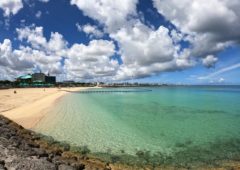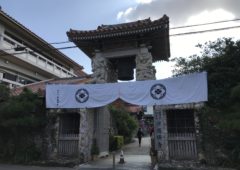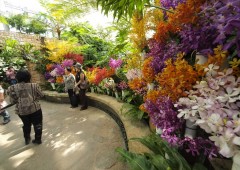2014.04.11
Best in the World vs. besuTO inn ZA wAruDO
By E. Heinrich-Sanchez
 With spring here a midst cool winds prevailing, the key Japanese word this month is “nyu” which sounds like “new” in English and means to enter. Nyu-Gakkou (school) ShiKi (ceremony) and Nyu En (KindergartEN) Shiki (ceremony) are everywhere.
With spring here a midst cool winds prevailing, the key Japanese word this month is “nyu” which sounds like “new” in English and means to enter. Nyu-Gakkou (school) ShiKi (ceremony) and Nyu En (KindergartEN) Shiki (ceremony) are everywhere.
Bright eyed first graders with their new shirts, walking nervously as they are welcomed by their elder classmates or “sempai’s” along with new teachers and municipal officials. This is an emotional time for parents as their precious children start their formal education.
The elementary students I planned to feature this week are now first year junior high school students. We helped them get their alphabet in order to lessen the shock and make the jump from elementary English to opening a text book full of English they need to “read” after the first week of school. In a flurry of activity, for new schooling, we could not make the time to meet. I will have a chance to introduce them later in the year and share with JU readers what their thoughts are on their new step into English education.
This is a good time to review the established educational models to see where we have been, consider our present situation to see what has worked and incorporate future plans in to our daily activity in order to get us to where we need to be, from Okinawa towards the Asia-Pacific. Japan’s new philosophies based on the “Asian Gateway Initiative” and the Ministry of Education, Culture, Sports, Science and Technology (MEXT) English Education Reform Plan for Globalization are major reform movements that have the potential to enhance and strengthen the efforts of the new Task Force formed at OIST for Okinawa’s self-sustaining future.
Their first meeting took place last December 8th and 9th. There is an urgent need to connect these important initiatives to the school “GEMBA” or place of work. The teachers in the front lines are entrenched in old models which are re-hashed as Asia-Pacific sails by. Students are still shied away from learning basic reading and forced into memorizing or encouraged by teachers and society to use “katakana” texts.
According to the surveys commissioned by MEXT, the number of students who dislike English is increasing and parallel with the increase in exposure to English.
Elementary school English is focused on fun activities and listening. A normal classroom and the text provided (for the 5th and 6th graders) already has a considerable amount of English with no emphasis on writing or deciphering the written words. The reliance on katakana starts here. Boards of Education and elementary school teachers find this as a relief. They can whisk through English classes without having to bother with pronouncing the English as it is too hard to read. Students are not required nor taught how to read. This is left for the Junior High School teachers. I have spent years in the JHS “Genba” and can attest that “reading” is not taught. Students are exposed to an endless drilling of flash cards to read and repeat. Word meanings are introduced based on the narrow context used in the chosen dialogue without considering the root and general meaning of the word. Foreign language teachers for the most part give up and go along thinking it is futile to get the students or teachers to pronounce English as English. Some Boards of Education have specific orders for native English teachers to have students use katakana in order for them to memorize an English story or speech. This is both counterproductive and seeds bad habits.
A paradigm shift is needed and warranted taking into consideration the enormous possibilities that we have before us as we are at the beginning of 10 year plans and the MEXT plans for the 2020 Olympics, English as a subject in the elementary school with EIKEN recommended as the test of choice.
Leaders from key institutions, business and government who gathered at the 2012,2nd International Workshop “Toward the Development of an R&D Cluster in Okinawa,” held at the Okinawa Institute of Science and Technology Graduate University (OIST) identified STEM education as the number one priority in the area of “Strategies to Attract, Retain and Develop Human Capital”, that needs attention in order to remain competitive followed by the need to improve language skills (English) followed by a “catch them while their young” strategy to identify and nurture talented students.
STEM stands for Science, Technology, Engineering and Maths. The “E” in STEM in my opinion stands for “English” and needs to include “ESD” (Education for Sustainable Development). The “M” also can stand for Music. This year 2014 is the last year of the United Nations Decade for Education on Sustainable Development.
“Okinawa needs to strengthen its STEM education to improve its standing in Japan and to compete with other regions in Asia” according to the workshop’s full summary. It was presented to Okinawa Prefecture who launched in 2012 its 10 year plan (2012-2022) to create policies and measures to create a suitable environment for entrepreneurship and reach self-sustaining growth.” The full summary is available in English and Japanese on the OIST website here:
http://www.oist.jp/eventreport/recommendations-and-summary-released-okinawa-rd-cluster-workshop. These important findings have not been circulated enough although relevant and in tune with Okinawa’s future.
Another major finding of the workshop was the need for the creation of an “organization that is responsible for planning and coordinating action needed to enhance the environment in Okinawa for entrepreneurial R&D cluster development” as it was highlighted in the recommendations.
The “Task Force” has been formed. According to the article by OIST posted on the website December 13, 2013, “The Task Force comprises three Working Groups. In each of these, experts and stakeholders focus on the Promotion Organization’s a) core mission, charge, and milestones, b) structure, entitlement, and stewardship, and c) financial models for formation and long-term sustainability. Task Force members will complete a preliminary report by March 31, 2014, in which recommendations will be made to the Minister of State for Okinawa and Northern Territories, the Okinawa Governor, and to leaders of public and private organizations in Okinawa.” the full article can be found here:
http://www.oist.jp/news-center/news/2013/12/11/task-force-put-gear-move-okinawa-rd-cluster-forward
In my opinion, this is a fantastic opportunity to put in line Prime Minister Abe’s “Asian Gateway Initiative” and the MEXT “English Education Reform Plan corresponding to Globalization” (EERPG) into a package towards establishing Okinawa as a “Regional Core Project” for the creation of a regional center of excellence or Regional Center of Expertise for ESD* which could focus on “catch them while they’re young” from the elementary school towards enhanced listening skills for language skills with an emphasis on English education for sustainable development.
According to the MEXT “Practical Handbook for Elementary School English Activities” published in 2001 (ISBN978-4-304-04078-8 C3037 by Karyudo 16th edition Feb.2008), It recommends in “Chapter 3: What Kinds of Teaching Methods Exist”?” the following* from page 143-144 under 3. Teaching Precautions (1) Do Not Translate Everything into Japanese. (2) Do Not Pronounce English Words Using Katakana Sounds (3). Do Not Force Students to Memorize (4) Do Not Correct Small Mistakes (5) Apply Various Learning Formats, No Only Whole-Class Lessons.
I would like to focus on No.(2) and challenge all JU readers who want to see Okinawa become competitive in the Asia-Pacific to perk up their musical ears and imitate English sounds for what they are as best as they can. Language is sound. Music is sound. Let’s get our musical talents to enhance the learning and mastery of English with a focus on “COMMUNICATION” and fun.
“(2) Do Not Pronounce English Words Using Katakana Sounds:
The problem with rendering English sounds with katakana is that English sounds cannot be truly represented with katakana. When katakana is used to represent English sounds, the sounds rendered are different from what is heard – a vowel sound will end each syllable, accents will be the same as in Japanese, etc. – and students will remember incorrect sounds. After taking such great efforts to expose students to “Assistant Language Teachers” (ALT native speakers) pronunciation, teachers should not use katakana to spell out what has been said. Elementary school English activities center around spoken English, with almost no time spent on reading. Consequently, it is unlikely that students would try to render English in katakana. When students try to do so, it is probably to help themselves remember what they have learned. In such cases, it is very important to reassure students that forgetting is not a problem, that they will naturally remember expressions as they use them again and again, and that undue efforts to memorize expressions are unnecessary.”
Our leadership needs to take this simple but key reality into consideration in order to achieve stated goals for a sustainable future in our globalized world. Okinawa could become the “Geneve” of Asia-Pacific.
Let’s put an end to the charade of English for bureaucratic fiction and satisfaction. Adult ego’s and profits, like dealers and pimps of Japanglish who have a strangle hold on Japan’s English education and future competitiveness.
Its time to save the children from this undue stress and torture when we can be having fun. It’s time to allow students in Okinawa to strive for communication, not perfection and give the gift of learning to read in order for them to read to learn about Science, Technology, Engineering ESD, Maths and Music.
Okinawa can lead the way and bring Japan to the top 5 countries of English proficiency and join the top ten for TOEIC scores in the Asia-Pacific by 2020.
Katakana is NOT English!
Best in Japan – Best in Asia-Pacific, Best in the World!
Asia Gateway Initiative
http://japan.kantei.go.jp/gateway/index_e.html
2014.01.23[Topics]
English Education Reform Plan corresponding to Globalization
The United Nations University Institute for Advanced Studies (UNU-IAS) UNU-Regional Center of Expertise for Education on Sustainable Development (ESD)
http://en.wikipedia.org/wiki/Regional_Centres_of_Expertise_(RCE)
Please use the Japan Update comments page below for your advice, and kind positive or negative comments.
info@japanupdate.com

 2024.06.08
2024.06.08 2024.05.25
2024.05.25 2024.04.26
2024.04.26 2024.04.22
2024.04.22 2024.04.10
2024.04.10 2024.01.31
2024.01.31 2024.01.02
2024.01.02 2023.12.27
2023.12.27 2023.11.16
2023.11.16






